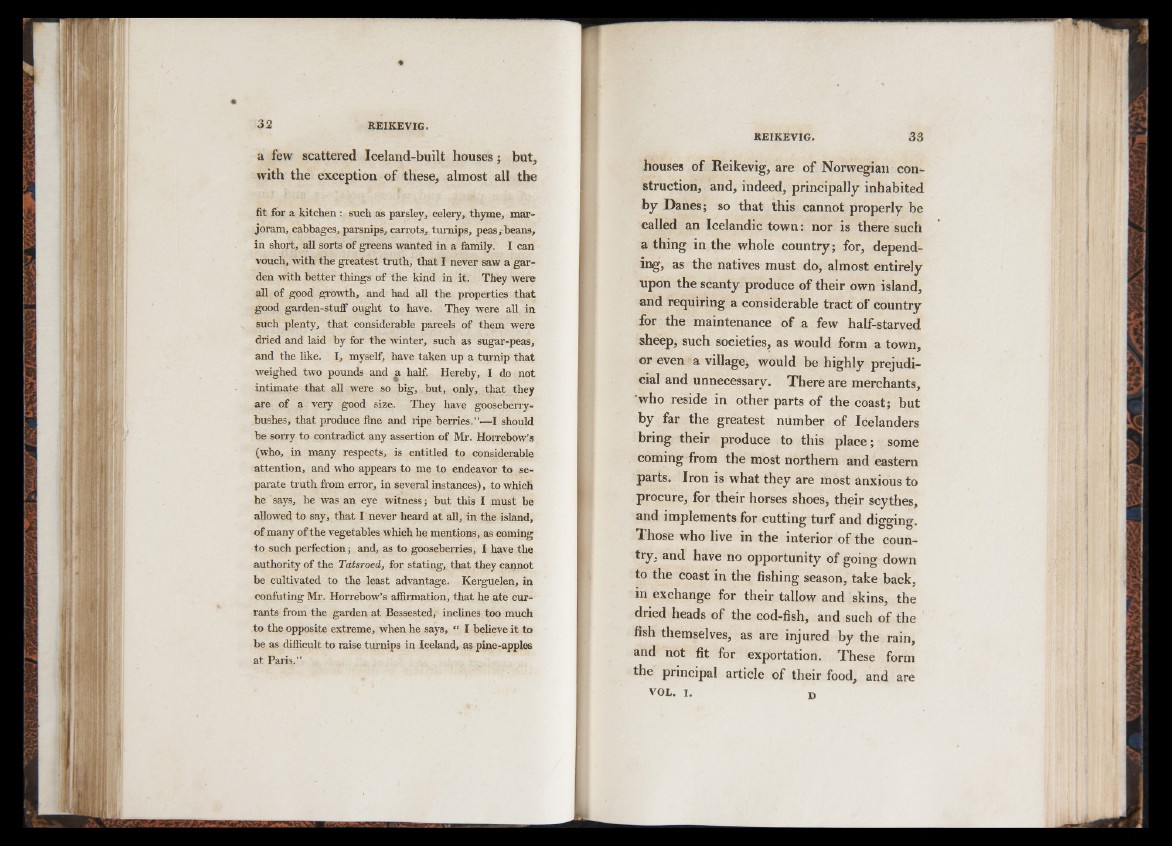
a few scattered Iceland-built houses • but,
with the exception of these, almost all the
fit for a kitchen: such as parsley, celery, thyme, marjoram,
cabbages, parsnips, carrots, turnips, peas,-beans,
in short, all sorts of greens wanted in a family. I can
vouch, with the greatest truth, that I never saw a garden
with better things of the kind in it. They were
all of good growth, and had all the properties that
good garden-stuff ought to have. They were all in
such plenty, that considerable parcels of them were
dried and laid by for the winter, such as sugar-peas,
and the like. I, myself, have taken up a turnip that
weighed two pounds and a half. Hereby, I do not
intimate that all were so big, but, only, that they
are of a very good size. They have gooseberry-
bushes, that produce fine and ripe berries.”—I should
be sorry to contradict any assertion of Mr. Horrebow’s
(who, in many respects, is entitled to considerable
attention, and who appears to me to endeavor to separate
truth from error, in several instances), to which
he says, he was an eye witness; but this i must be
allowed to say, that I never heard at all, in the island,
of many of the vegetables which he mentions, as coming
to such perfection; and, as to gooseberries, I have the
authority of the Tatsroed, for stating, that they capnot
be cultivated to the least advantage. Kerguelen, in
confuting Mr. Horrebow’s affirmation, that he ate currants
from the garden at Bessested, inclines too much
to the opposite extreme, when he says, “ I believe it to
be as difficult to raise turnips in Iceland, as pine-apples
at Paris.”
houses of Reikevig, are of Norwegian construction,
and, indeed, principally inhabited
by Danes; so that this cannot properly be
called an Icelandic town: nor is there such
a thing in the whole country; for, depending,
as the natives must do, almost entirely
upon the scanty produce of their own island,
and requiring a considerable tract of country
for the maintenance of a few half-starved
sheep, such societies, as would form a town,
or even a village, would be highly prejudicial
and unnecessary. There are merchants,
who reside in other parts of the coast; but
by far the greatest number of Icelanders
bring their produce to this place; some
coming from the most northern and eastern
parts. Iron is what they are most anxious to
procure, for their horses shoes, their scythes,
and implements for cutting turf and digging.
Those who live in the interior of the coun-
try, and have no opportunity of going down
to the coast in the fishing season, take back,
in exchange for their tallow and skins, the
dried heads of the cod-fish, and such of the
fish themselves, as are injured by the rain,
and not fit for exportation. These form
the principal article of their food, and are
VOL. I. jj